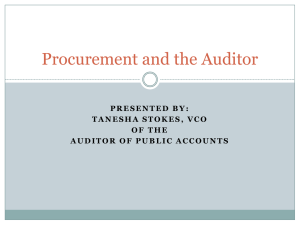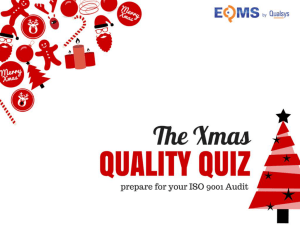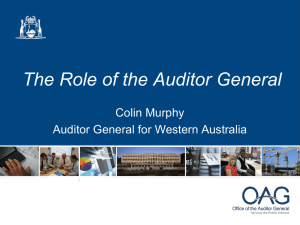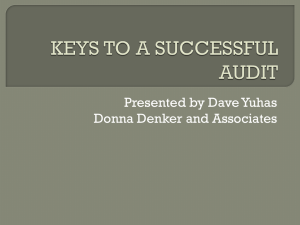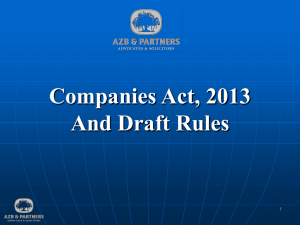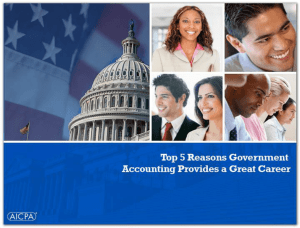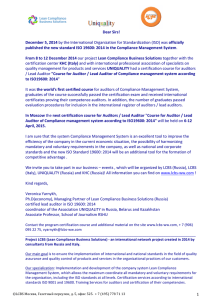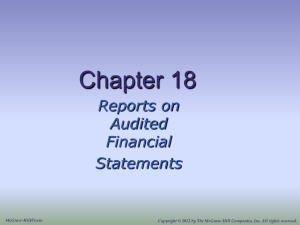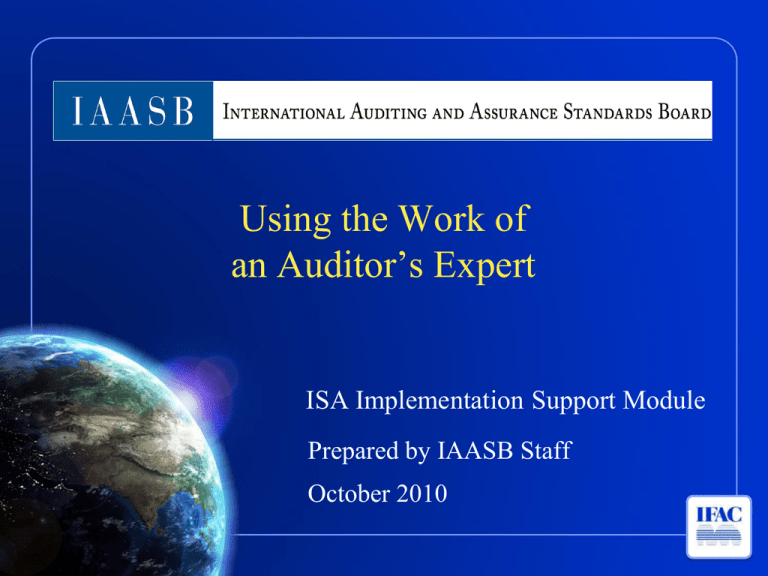
Using the Work of
an Auditor’s Expert
ISA Implementation Support Module
Prepared by IAASB Staff
October 2010
Overview
• Introduction
• Significant Features of New Standard
– Who is an Auditor’s Expert?
– Need for an Auditor’s Expert
– Management’s Experts
– The “Sliding Scale” for Work Effort
– Competence, Capabilities and Objectivity
– Understanding the Auditor’s Expert’s Field
– Agreement with the Auditor’s Expert
– Adequacy of the Auditor’s Expert’s Work
– Reporting Implications
2
Introduction
• The context for revising ISA 620
– Developments in financial reporting, such as wider
use of fair value accounting, calling for more frequent
use of experts
– Experts increasingly involved throughout entire audit
process, not just with respect to substantive
procedures regarding measurement of account
balances
– Developments in related national standards and
guidance
3
Who is an Auditor’s Expert?
An individual or
organization
Expertise other than
accounting or auditing
Auditor’s
Expert
Internal or external to
the firm
Assists the auditor in
obtaining sufficient
appropriate audit
evidence
4
Need for an Auditor’s Expert
• Standard requires overriding question to be
asked: Is an auditor’s expert needed for the
engagement?
– Risk may increase when other expertise is needed to
prepare the financial statements
– Engagement partner should be satisfied that
engagement team collectively has appropriate
competence and capabilities
– Keep the situation under review as the audit
progresses − circumstances may change
5
Need for an Auditor’s Expert
• Relevant considerations
– Nature, significance and complexity of the matter
– Has management used an expert?
– What are the related risks of material misstatement?
– What sort of procedures are likely to be necessary?
• An auditor’s expert not always needed in every case
– In some cases, the auditor, although not an expert, may
have enough understanding of a field to perform the audit
without an auditor’s expert
6
Management’s Experts
• Old ISA dealt with management’s experts as
well as auditor’s experts
• Material on management’s experts has been
moved to ISA 500 because
– Management, not the auditor, directs their work
– Management’s experts can never be independent
of management
7
The “Sliding Scale” for Work Effort
• Nature, timing and extent of procedures with
respect to an auditor’s expert will vary depending
on circumstances such as
– Nature of the matter
– Relevant risks of material misstatement
– Significance of the expert’s work
– The auditor’s knowledge and experience with previous
work performed by the expert
– Whether the auditor’s expert is subject to the firm’s
quality control (QC) policies and procedures
8
The “Sliding Scale” for Work Effort
• Auditor’s internal experts are subject to the firm’s
quality control policies and procedures
– Partners and staff of the firm (including temporary staff)
– Partners and staff of a network firm may also be subject
to common QC
• Reliance on firm’s QC may reduce extent of work
needed on, e.g.:
– Competence, capabilities and objectivity of the expert
– Agreement with the expert
– Evaluating adequacy of the expert’s work
9
Evaluating Competence, Capabilities & Objectivity
• Relevant considerations include
– Is the auditor’s expert’s work subject to professional or
industry requirements?
– Is the expert’s competence relevant to the matter at hand?
– Is any accounting or auditing competence expected in
addition to competence in the expert’s particular field
and, if so, does the expert possess that competence?
– Do changing circumstances indicate a need to reconsider
initial evaluation as the audit progresses?
• Various sources of information may be used
10
Objectivity
• Independence required for internal, not external,
auditor’s experts
• Objectivity required for all auditor’s experts
• Use “threats and safeguards” approach to
evaluate objectivity
– Are threats to objectivity, e.g., familiarity and selfreview, eliminated or reduced to an acceptable level
by safeguards?
• A number of procedures may be performed to
evaluate objectivity
11
Understanding the Auditor’s Expert’s Field
• Understanding needs to be sufficient to determine
nature, scope and objectives of the expert’s work
and to evaluate the adequacy of that work for the
auditor’s purposes
– Understand relevant aspects of the expert’s field
– The auditor does not need to become expert in the field
himself or herself
• Sources of information similar to those when
evaluating the expert’s competence, capabilities and
objectivity
12
Agreement with the Auditor’s Expert
• Agreement is always needed
– Nature, scope and objectives of the expert’s work
– Respective roles and responsibilities of the auditor and the
expert
– Communication between the auditor and the expert
– Need for the expert to observe confidentiality requirements
• Level of detail and formality of the agreement
– Use a “sliding scale” approach
• Agreement need not always be formally in writing
13
Adequacy of the Auditor’s Expert’s Work
• Evaluate for the auditor’s purposes
– The expert’s findings or conclusions
– The expert’s assumptions and methods (when
significant to the expert’s work)
– The source data used by the expert (when
significant to the expert’s work)
14
Reporting Implications
• No reference to the auditor’s expert in unmodified
auditor’s report
– Unless required by law or regulation (mostly public
sector)
– If required, indicate that the reference does not reduce the
auditor’s responsibility
• If reference is needed in relation to a modification
– Indicate that the reference does not reduce the auditor’s
responsibility
• May need expert’s permission to make reference
15
International Federation
of Accountants
Copyright © October 2010 by the International Federation of Accountants
(IFAC). All rights reserved. Permission is granted to make copies of this work
provided that such copies are for use in academic classrooms or for personal use
and are not sold or disseminated and provided that each copy bears the
following credit line: “Copyright © October 2010 by the International
Federation of Accountants (IFAC). All rights reserved. Used with permission of
IFAC. Contact permissions@ifac.org for permission to reproduce, store, or
transmit this work.” Otherwise, written permission from IFAC is required to
reproduce, store, or transmit, or to make other similar uses of, this work, except
as permitted by law. Contact permissions@ifac.org.
ISBN: 978-1-60815-074-8
www.ifac.org

